Living in Brisbane requires more than just comfort—it's about achieving precise climate control tailored to your lifestyle. With the intense summer humidity, unpredictable storms, and unexpectedly cool winter evenings, every Brisbane home necessitates an HVAC system designed not only for performance but also for enhancing your daily living experience. Precision Electrical & Air presents this comprehensive guide on HVAC systems and their pivotal role in improving indoor living conditions amidst Queensland’s unique subtropical climate.
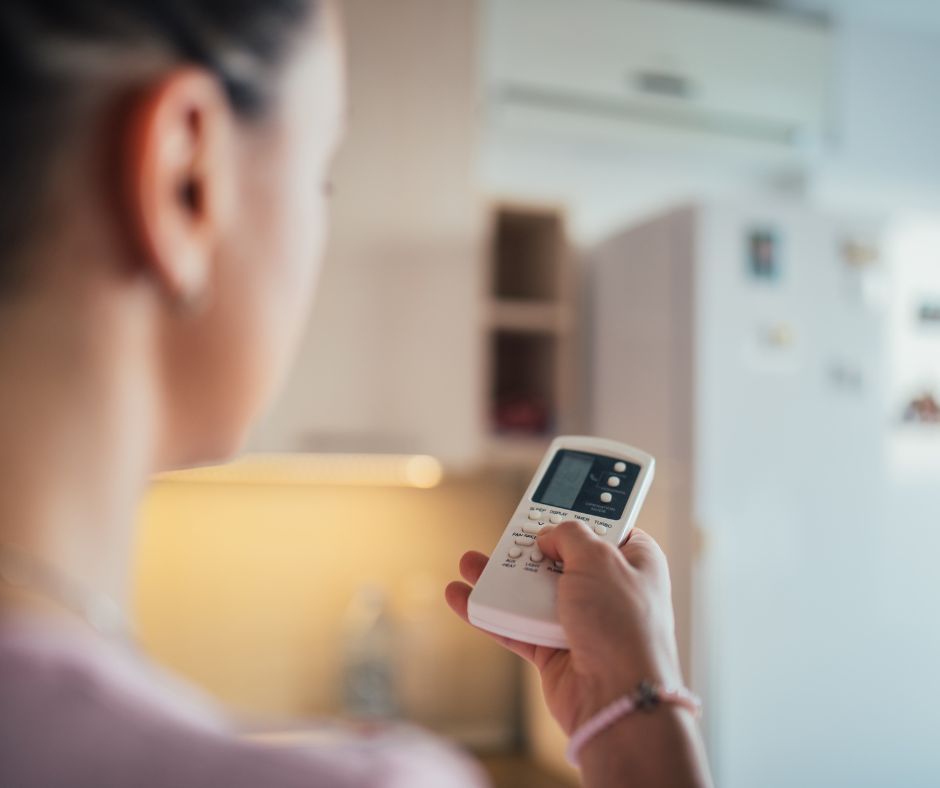
Understanding the Full Scope of HVAC: Heating, Ventilation, and Air Conditioning
HVAC is an acronym that stands for Heating, Ventilation, and Air Conditioning. This term encompasses a broad range of systems and technologies designed to maintain optimal indoor temperature, humidity levels, and overall air quality within your home or workplace. Many people may mistakenly associate HVAC solely with air conditioning; however, it is crucial to recognise that in Brisbane, where humidity management and consistent air circulation are vital year-round, the scope of HVAC is much broader and essential for comfort and health.
During those sweltering 35-degree days of summer, or when you're battling humidity during a subtropical storm, your HVAC system tirelessly works to provide clean, conditioned air that flows seamlessly throughout each room of your home. Optimising this system is key to enjoying a comfortable and healthy living environment.
The Functionality of HVAC Systems in Brisbane’s Unique Climate
HVAC systems typically function by conditioning the air—either heating or cooling it—and subsequently distributing it throughout your home via ductwork or directly into individual rooms. These systems can be classified as either ducted or split systems, with each type offering distinct advantages based on your property and personal needs.
- Ducted HVAC Systems: These comprehensive systems feature a central unit that efficiently pushes cooled or heated air through concealed ducts located in ceilings or walls, making them particularly suitable for larger homes or multi-room configurations.
- Split System Air Conditioning: These systems are perfect for individual rooms or smaller apartments, consisting of an outdoor compressor and an indoor unit mounted on the wall. They are both cost-effective and energy-efficient, making them a popular choice for many Brisbane residents.
In Brisbane's environment, both types of systems must effectively manage extreme humidity levels. Fortunately, most contemporary units automatically dehumidify the air during the cooling process, which is essential to prevent issues like mould growth, unpleasant odours, and sticky discomfort that can affect your indoor living experience.

Navigating Brisbane’s Climate: The Critical Role of Proper Ventilation
Ventilation is often overlooked as a crucial component of the HVAC system, yet it plays an essential role in Brisbane homes. The combination of high humidity levels and tightly sealed structures can result in stale air, the accumulation of trapped pollutants, and even structural damage caused by condensation.
Mechanical ventilation systems, such as energy recovery ventilators, are designed to circulate fresh air throughout your home without the need to open windows. These systems effectively extract stale, moisture-laden air and replace it with filtered, temperature-controlled fresh air. This function is especially vital during Brisbane’s wet season, as opening windows can inadvertently exacerbate indoor humidity levels.
Moreover, natural ventilation strategies still hold value in Queensland homes. Consider the classic Queenslander architecture, which was designed to maximise airflow by being elevated to capture breezes. Features such as cross-ventilation through louvre windows, whirlybirds for roof cavity circulation, and shaded eaves enable homes to breathe naturally without allowing excessive heat to penetrate.
Exploring Common HVAC System Types in Brisbane
1. Split System Air Conditioners
- Ideal for individual rooms or spacious open-plan living areas.
- Available in both cooling-only and reverse cycle variants, ensuring year-round climate control.
- Often equipped with ionisation or anti-microbial filters to effectively combat allergens.
2. Ducted Reverse Cycle Air Conditioning
- Perfect for families desiring consistent comfort across multiple zones.
- Integrates seamlessly with smart thermostats, promoting energy efficiency.
- Can be customised with additional ventilation and filtration options to suit specific needs.
3. Evaporative Cooling Systems
- While not recommended for Brisbane due to its high humidity levels, evaporative cooling systems are still utilised in drier regions such as Ipswich or Toowoomba.
- These systems operate by using water-soaked pads to cool the air, which is then distributed through ducts.
- Effective operation requires open windows or roof vents to allow humidified air to escape.
4. Heat Pumps
- Frequently utilised for hot water systems, heat pumps can also be integrated into HVAC solutions.
- They are highly efficient at extracting ambient heat, even during Brisbane’s mild winter months.
5. Mechanical Ventilation Systems
- Includes a range of devices such as fans, ceiling fans, extraction units, and heat recovery systems.
- Essential in many energy-efficient homes to prevent the buildup of stale air.
- Particularly advantageous in areas such as bathrooms, kitchens, and bedrooms where air quality is crucial.
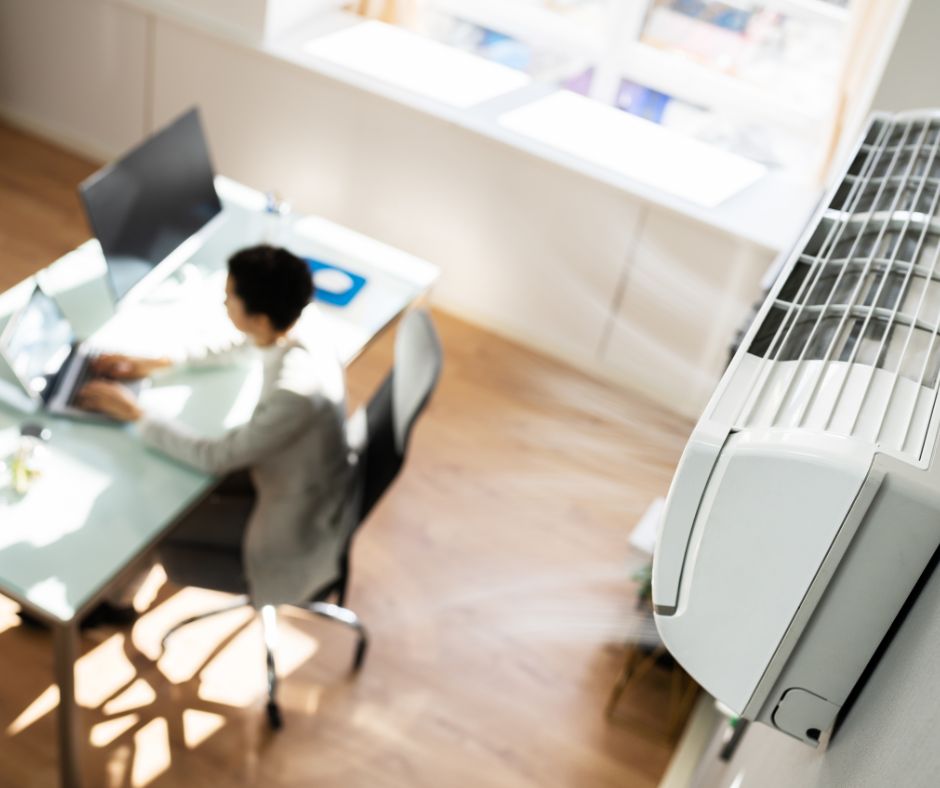
Understanding Indoor Air Quality: Its Importance in Brisbane Homes
Humidity is a significant factor that attracts airborne contaminants, such as mould, bacteria, and dust mites. Therefore, selecting the appropriate air filtration and air conditioning settings is essential for maintaining a healthy indoor environment:
- Ionisation Filters: These filters generate charged particles that attach to pollutants, making them easier to capture or break down. They are particularly beneficial for standard homes with mild allergy concerns.
- HEPA Filters: These dense, hospital-grade filters effectively capture microscopic particles, including pollen, fine dust, and viruses. However, their restrictive airflow makes them better suited for standalone purifiers rather than larger air conditioning systems.
- Carbon Filters: These filters are designed to eliminate odours and volatile organic compounds, making them useful in kitchens and areas adjacent to garages.
Modern residences in Brisbane frequently incorporate multi-stage filtration systems within their HVAC units to tackle outdoor pollution, pet dander, and various allergens, ensuring a healthier living environment.
Optimising Energy Efficiency with Smart Thermostats and Zoning in Brisbane Homes
As energy costs continue to rise, implementing zoning and smart climate control solutions has become increasingly vital. A zoning system divides your home into distinct areas that can be cooled or heated independently. When integrated with a smart thermostat, this system allows for:
- Individual temperature control for each room
- Scheduled climate adjustments tailored to your lifestyle
- Mobile app access for remote management
- Automatic eco modes that adjust to Brisbane’s temperature variations
This combination not only conserves energy but also reduces the strain on your HVAC system, while providing enhanced comfort that aligns with your unique living patterns.
Essential Components That Make Up Your HVAC System
- Air Handler: Responsible for moving air through the HVAC system.
- Compressor & Condenser: These components work together to extract heat from inside your home.
- Evaporator Coil: This coil absorbs heat from the indoor air, contributing to the cooling process.
- Refrigerant: A vital component that transfers heat between the indoor and outdoor units.
- Ductwork: This network carries conditioned air throughout your home, ensuring every room is comfortable.
- Thermostats: These devices set and maintain the desired indoor climate.
- Vents and Registers: These components effectively distribute and return air within the system.
Essential HVAC Maintenance Tips for Brisbane Homeowners
- Clean or replace filters monthly during peak usage seasons to maintain efficiency.
- Schedule professional air conditioner servicing well before summer arrives to ensure optimal performance.
- Ensure that ducts are securely sealed and that insulation is intact to prevent air leaks.
- Regularly clear any debris surrounding external condenser units to maintain airflow.
Due to the high humidity and presence of subtropical pests, outdoor units can be affected quickly; hence, proactive maintenance is crucial for the longevity and reliability of your HVAC system in Queensland’s climate.
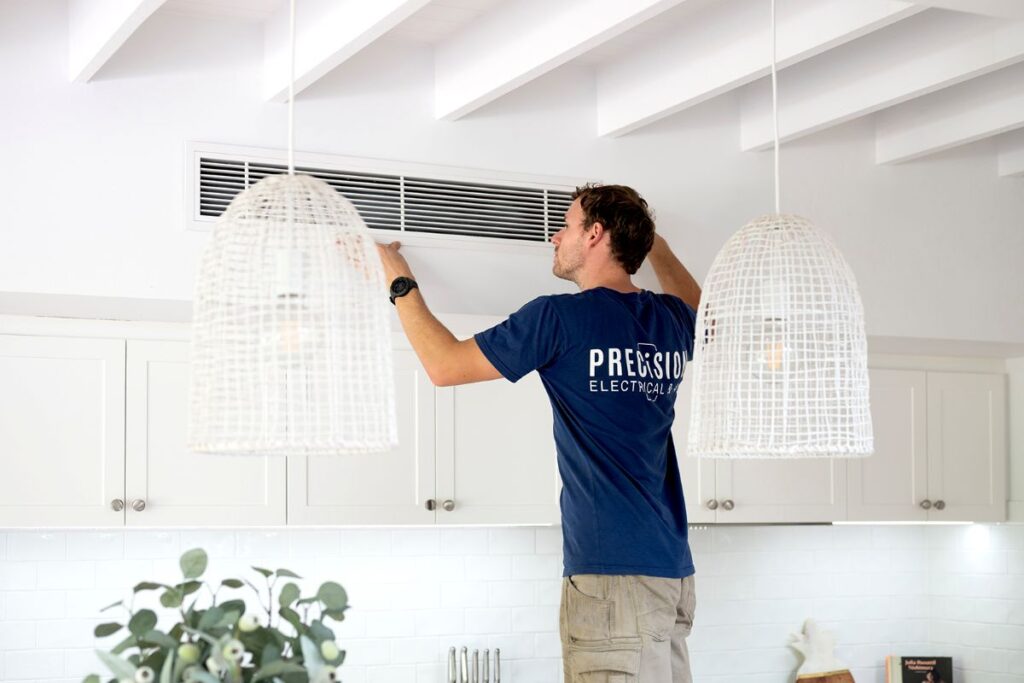
Understanding the Importance of HVAC Systems for Brisbane Homes
HVAC systems are not merely about cooling; in the Brisbane context, they are about creating a robust system that effectively manages moisture, airflow, temperature fluctuations, and air quality.
Precision Electrical & Air specialises in designing systems that meet these needs while providing energy savings and long-term reliability.
From efficient split systems to ducted air conditioning solutions featuring zoned control and advanced filtration options, we ensure that the residents of Brisbane enjoy year-round comfort that aligns perfectly with their specific climate and lifestyle requirements.

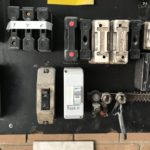
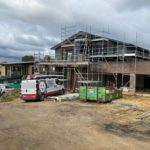
It’s fascinating how our environment shapes our daily lives, and in Brisbane, that’s particularly true with the interplay of humidity and temperature. The focus on HVAC systems not only for comfort but for improving quality of life really hits home. I’ve noticed a significant difference in my own well-being since upgrading to a more efficient HVAC system. It’s not just about escaping the heat; it’s about creating a space that feels rejuvenating, especially during those sweltering summer days.
Your insights on the necessity of a well-designed HVAC system in Brisbane resonate deeply, especially considering the city’s unique subtropical climate. I remember when I first moved here; the intense summer heat and the sudden downpours felt overwhelming at times. I quickly realized how crucial it was to have an effective HVAC system that could adapt to those fluctuating conditions.
Your exploration of HVAC systems in a subtropical climate like Brisbane resonates with many of us who face the yearly struggle of extreme weather variations. I’ve often found that the comfort of our homes directly impacts not just our day-to-day comfort, but also our overall wellbeing and productivity.
You raise an important point about the nuanced needs of HVAC systems in Brisbane’s climate. It’s fascinating how the subtropical conditions here demand a more holistic approach to indoor air quality beyond just cooling. I’ve personally found that investing in a reliable ventilation system is just as critical as air conditioning, especially to combat humidity and prevent mold growth during our steamy summers.
You’ve really hit the nail on the head about the importance of ventilation. In Brisbane’s humidity, it’s easy to overlook how critical the balance between air conditioning and proper airflow is. Humidity can sneak up on us, making environments uncomfortable, and that’s where a good ventilation system shines.
You’ve highlighted a crucial aspect of maintaining comfortable and healthy indoor environments, especially in a place like Brisbane. The subtropical climate certainly comes with its own set of challenges, particularly with humidity and the risk of mold, as you mentioned.